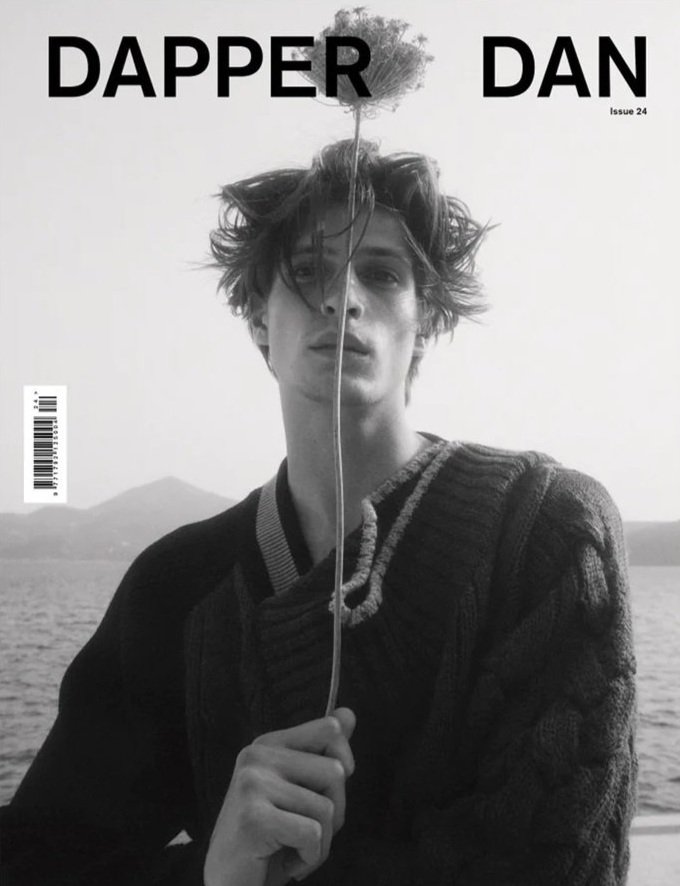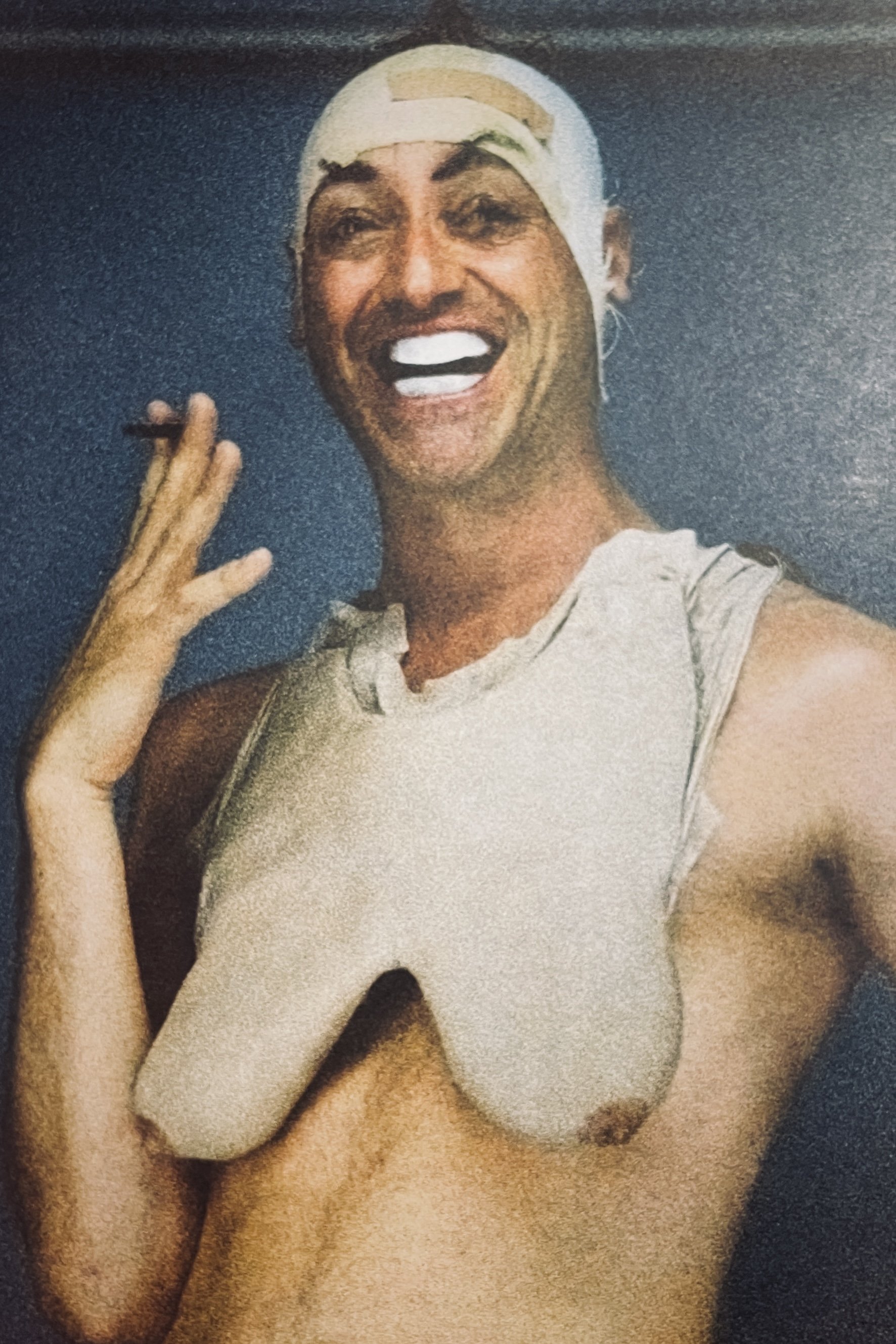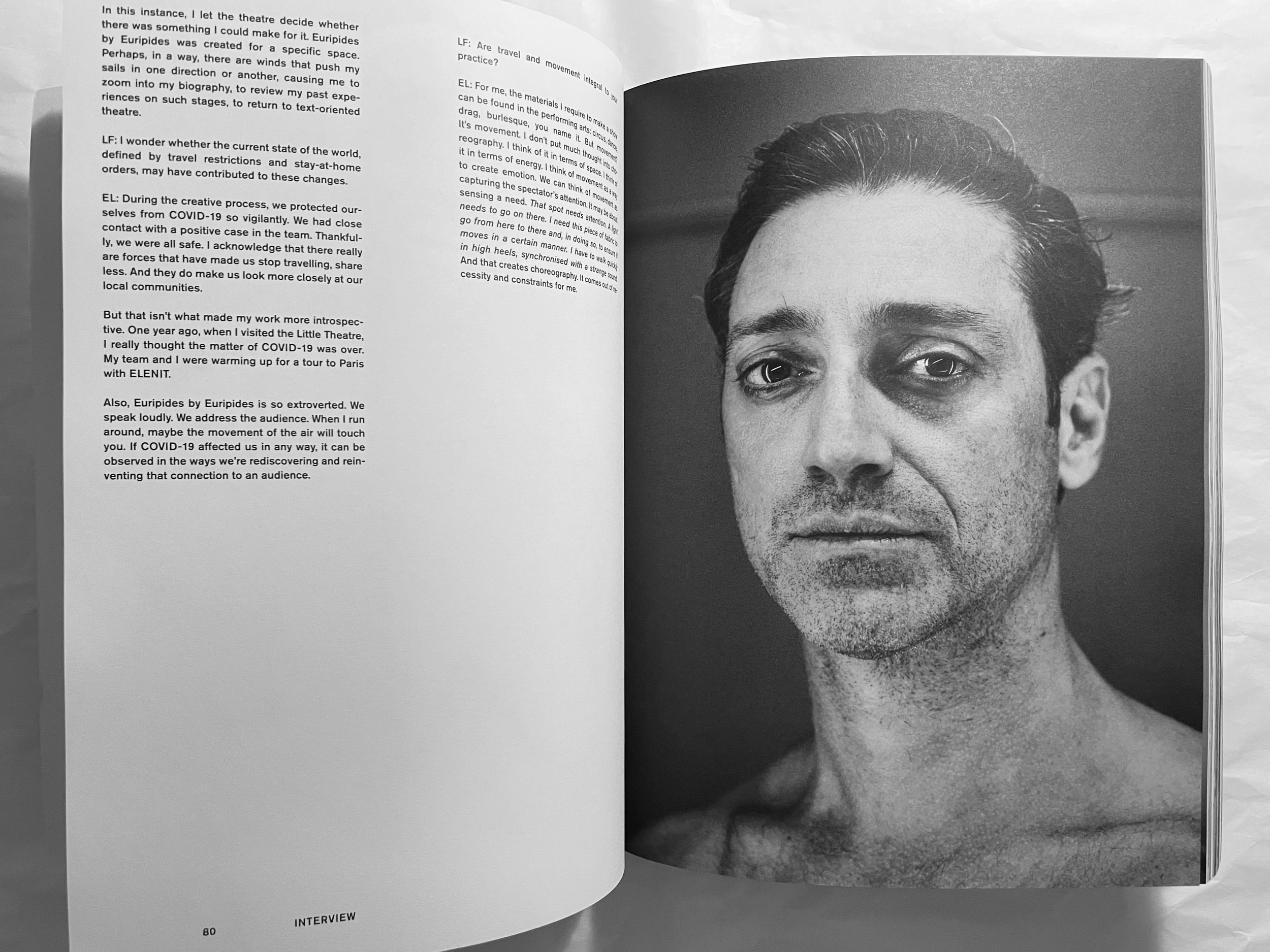When TOURNÉ was still 'Euripides by Euripides,' Luke Forbes engaged in a delightful conversation with Euripides Laskaridis. Dive into the pages of Dapper Dan's 24th issue to explore their exchange, accompanied by photographs courtesy of Panos Davios.
Discover insights into the Greek performing arts scene, Euripides' connection to ancient Greek theatre, and his reflections on summer nights in the starlit amphitheaters of Epidaurus.
Continue reading for more...
In 2021, the end-times events of the actual world coincide with a nostalgic return in Euripides practice to more familiar, homely themes: namely, Greece and his biography. In the passages below he explains that the return to his personal bedrock at this point in time is coincidental. And yet it taps into a collective desire for a more stable lived experience in the face of uncertainty nonetheless.
My conversation with Euripides took place shortly after the premiere showing of ‘Euripides by Euripides’ was postponed for the foreseeable future – as a consequence of raging wildfires, on this occasion, as opposed to COVID-19-related public health measures.
Does the Ancient Greek amphitheatre bear special significance for you?
During my studies at a leading Greek drama school, each summer some students would get the chance to perform one Ancient Greek tragedy or comedy all over Greece in open-air theatres. Before I left Greece and went to New York for further studies, I had these experiences of the summer tour, touring Ancient Greek drama. I would daresay it's a whole culture. For Greeks, it's something we can truly identify with. The leading protagonists, we know them by their first names. They perform in this extravagant way we know well.
Given Ancient Greek drama is my heritage, and given my name is Euripides, there's a connection I've felt for many years with my Greekness. For Greek artists, it's a heavy weight on our shoulders. We compare ourselves to such artistic achievements. The Parthenon is right there at the centre of our capital city.
And I've always wondered, What would be my way to connect with the Ancient Greek world and its texts? ‘Euripides by Euripides’ is my way. For instance, because of my name, I was interested in making a small joke about Euripides, the playwright, and Euripides, my grandfather. You see, in Greece, it is a tradition to be named after your grandfather.
I'm interested in your current preoccupation with Ancient Greek drama, although you are commonly considered a choreographer. Where do you situate your artistic practice?
I wanted to be an actor, to work in theatre. I went to drama school and I loved performing as an actor. I did movies and TV. And then I saw Dimitris Papaioannou, a young choreographer at the time. I thought, What is this? It's not theatre, but it's speaking to me. In New York, where I started directing, I realised there's an entire universe of performance I wasn't aware of previously, a mixing of genres. I had the opportunity to watch works by Bob Wilson, Pina Bausch, William Forsythe, Robert Lepage, Sasha Waltz and even Laurie Anderson.
When I returned to Greece, Dimitris was auditioning and I knew and loved his work already. I worked with Dimitris in three productions and through that process I observed how to make works that are movement and image oriented. And upon the creation of RELIC, I realised that I was being invited to dance festivals as a non-dancer who's not a choreographer with a work I didn't consider dance.
Theatre festivals are not as accepting of me. Theatre means text to theatre festivals. Theatre festivals have prerequisites. In contrast, dance is such an open art form. Dance festivals can be very accepting. I feel blessed because dance can give shelter to quirky artists like me. And the dance audience is more prepared to contemplate a new proposition that is not on the well-beaten path.
To what extent do you consider your audience's desires as you create new works?
When I go into the rehearsal space and I try something out, I rarely think of the audience per se. I'm the audience of my work while I'm creating it, exploring things that tickle me at any given moment. I ask myself in those moments, Can I create something that will make me happy if I have to perform it for the next 20 years? Can I create something that plays with the fabric of the artist that I am? Can I see my performance in the mirror and want to share it with the public? My focus is on continually listening to my artistic needs.
Does your latest work mark a change in your artistic voice beyond its thematic focus? Is ‘Euripides by Euripides’ formally different to your previous works?
It's the most autobiographical of the works I've made over the past six years. Also, normally, I would use an imaginary, non-existent language. But this time true language snuck in. My background isn't in dance, I'm a theatre actor and director. So, in a sense, I'm going back to my theatre and drama roots.
How do you explain this return to your roots?
I feel that the shifts in my work are natural developments. More and more, I feel comfortable trusting my instinct on where I need to go. It's no longer such an intellectual process. I let go after TITANS. Now, I give myself permission to lose myself in the pool of wishes, inspiration without reason. This is where I should swim now.
That being said, when I was invited to create something for the Little Theatre, I asked to spend an evening there first. Arrangements were made with the archaeologists of the site and I went there at seven o'clock in the evening to watch the sun set in the space.
In this instance, I let the theatre decide whether there was something I could make for it. ‘Euripides by Euripides’ was created for a specific space. Perhaps, in a way, there are winds that push my sails in one direction or another, causing me to zoom into my biography, to review my past experiences on such stages, to return to text-oriented theatre.




